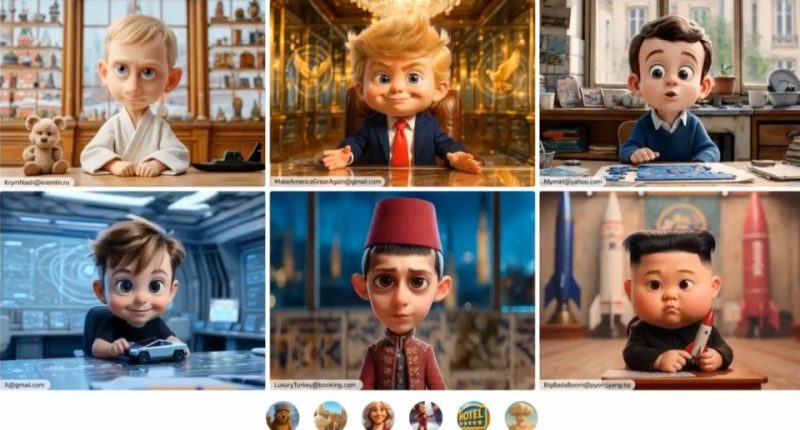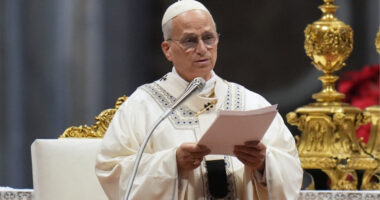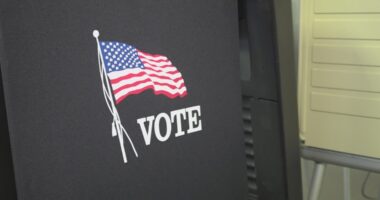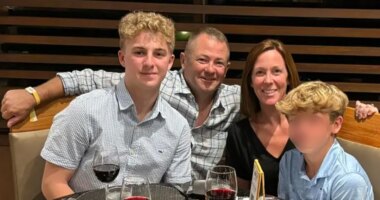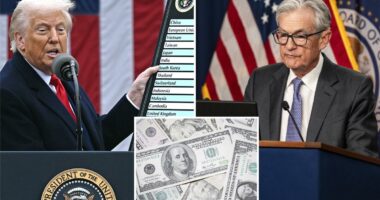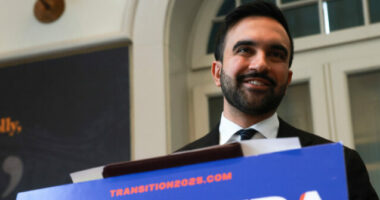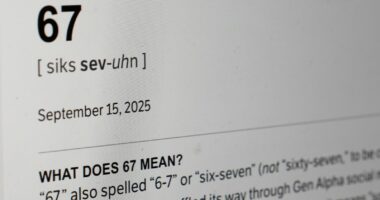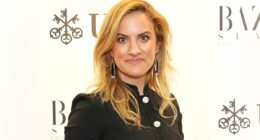Share this @internewscast.com
TWISTED Putin’s brainwashing programme has plunged to new depths with a dystopian propaganda cartoon aimed at toddlers.
The animated kids’ show uses toddler versions of world leaders to plant pro-Putin and anti-Western sentiments before kids can even walk or talk.
Putin’s chief propagandist, Vladimir Solovyov, spearheaded the new show called Sandpit.
The producers say its aim is to “instil patriotism from an early age” and teach Russian infants to “discuss geopolitics”.
A teaser lasting 30 seconds appeared on Solovyov’s Telegram channel, featuring toddler-like versions of Putin, Trump, Macron, Musk, Erdogan, and Kim Jong-un engaging in a video chat.
In a playful exchange, Kim remarks to Macron that he should be excluded from their group, teasing, “because you spend all your time with your grandma” – a dig at the French president’s spouse, Brigitte, who is 24 years older than him.
During the call, Trump inquires about the use of a Russian video app, to which Putin humorously responds by poking fun at Western tech: “It’s because your Skype failed, that’s the reason.”
Speaking to The Sun, Dr Alasdair McCallum, a Russian propaganda expert at Australia’s Monash University, says: “The Sandpit cartoon is taking things to new extremes.
“You have these quite bizarre AI-generated cartoons aimed at toddlers.
“The aim is to indoctrinate from as early as possible – before they can even walk.”
Dr McCallum thinks the message in the trailer couldn’t be more obvious.
He explains: “The idea is that Russia is strong and the West is weak, so Trump, Macron and Musk are depicted as goofy and incapable of making strong decisions, whereas the little toddler version of Putin is very strong and composed.”
Putin, whose face appears kind and calm, is shown wearing a crisp white judo uniform.
Next to the Russian president sit a teddy bear, a symbol of national identity, and a black toy ship, representing the Russian Navy’s Black Sea Fleet.
Meanwhile Kim, who is currently sending troops and weapons to back Putin’s war in Ukraine, comes across as missile-mad, gripping a toy rocket tightly with both hands.
Towering missiles also loom in the background of the dictator’s room – which, with its lack of windows, resembles a bunker.
And to drive the point home further, Kim’s email address – BigBadaBoom@pyongyang.kp – is a blatant nod to explosions, paired with the mock domain of North Korea’s capital.
Erdogan, whose email address is LuxuryTurkey@booking.com, is also portrayed in a wildly exaggerated style.
Wearing the traditional fez, the Turkish president appears against an ornate, Ottoman-inspired backdrop.
While presidents like Erdogan and Macron show cracks of anxiety, Trump and Musk grin smugly.
The businessman-turned-president sits in a gaudy room, while the Tesla CEO appears fixated on his toy car.
The cartoons even have their own avatars: Putin is a bear with a red star, Kim is a mushroom cloud and Trump is the pope blessing worshippers.
Many of the references will sail right over kids’ heads, Dr McCallum admits, but he says they serve the additional aim of shocking the rest of the world.
He explains: “A lot of Russian propaganda has a kind of shock element to it.
“This is why you often see extreme messages about the amount of nukes they could drop on Britain.”
He believes the timing of the show’s launch is far from a coincidence.
UK intelligence revealed in early June that Russia has suffered huge war losses, with about one million of its own soldiers either killed or wounded in the war in Ukraine since February 2022.
“They need to replenish that manpower, they have to try to indoctrinate them early,” says Dr McCallum.
But he finds it hard to imagine any of Solovyov’s eight privileged, Western-educated kids – born to three different women – dying on the front line in Donetsk.
“It’s always the lower echelons of society that get fed into this propaganda mill and then go to fight and die,” he adds.
Sandpit comes as the Kremlin ramps up efforts to target children – both Russian and Ukrainian – with state propaganda.
At Russia’s Victory Day parades, prams are turned into cardboard tanks and babies are dressed in tiny army uniforms.
Youth groups like Yunarmiya, along with school visits featuring war veterans, actively expose kids – even as young as preschool age – to the world of weaponry and military culture.
While boys are targeted with militaristic messaging, girls are fed pro-natalist narratives, pushing them toward motherhood and care-giving roles, says Dr McCallum.
Teenage girls are reportedly paid as much as £1,000 to have babies in more than 10 regions across Russia, including Oryol and Yaroslavl in the west, and Kemerovo in Siberia.
A TV show previously called ‘Pregnant at 16’ – intended to discourage teenage pregnancies – was rebranded as ‘Mama at 16’ in January.
Each episode now opens with the more optimistic phrase “I’m expecting a child” instead of the former “I’m pregnant”.
The channel that airs ‘Mama at 16’ also broadcasts similarly themed shows like ‘Supermum’, ‘Maternity Ward Days’, ‘Call Me Mum’ and ‘Mama at 45’.
Its website reads: “Yu is a reality show network about the most important things for a young woman: family, children, mother-in-laws, mums, friends and, of course, love.”

Who is Vladimir Solovyov?

VLADIMIR Solovyov is a leading TV presenter and pro-Putin propagandist.
Born in 1963 to a Jewish family in Moscow, he has hosted the prime-time show Evening with Vladimir Solovyov on state channel Russia-1 since 2012.
Known for his staunch support of Putin’s policies, Solovyov has been a vocal advocate for Russia’s war in Ukraine.
On the eve of Russia’s full-scale invasion of Ukraine in 2022, Solovyov was sanctioned by the EU and banned from entering its member states.
Solovyov at the time said: “Today is the day that a righteous operation was launched for the de-Nazification in Ukraine.”
In August 2022, following proposals by some EU countries to ban tourist visas for Russians, Solovyov even suggested missile strikes on Berlin, Paris, London and Brussels.
At school, children face mandatory weekly lessons called “Conversations about Important Things”, where patriotism is drilled in and dying for the Motherland is glorified.
The course was introduced in September 2022 – eight months after Russia’s full-scale invasion of Ukraine.
In September 2023, new history textbooks were distributed across Russian schools that glorify Russia, omit criticism of Stalin and portray the West as aggressors.
Children are taught that Ukraine is a “Nazi state” and that Russia’s invasion is justified – no different to Putin’s claim that it’s “a question of life and death, the question of our historic future as a people”.
Dr McCallum explains: “A central element of Russian propaganda is that Russia and ethnic Russians were the sole victors over Nazism and that Ukraine is an artificial Nazi state.
“But this doesn’t gel with the reality of a Jewish president [Zelensky] and support from European countries.”
More Russians are rejecting Putin’s propaganda
Contrary to popular belief, the majority of Russians do not rely solely on state-controlled TV.
Dependence on state TV dropped sharply from around 90 percent to just over 60 percent from 2013 to 2021, according to the Atlantic Council.
Meanwhile, over 85 percent of Russians are said to have internet access.
Despite increased Kremlin censorship, independent platforms like YouTube and Telegram remain accessible in Russia.
Many people also use virtual private networks (VPNs) to bypass restrictions.
The majority of Russians still back the war in Ukraine, according to the latest 2025 surveys from Levada Center, Statista, and VCIOM.
But the data reveals a growing appetite for peace talks.
Younger generations, in particular, show lower support for the conflict compared to their elders.
However, experts warn that public surveys on Russian support for the war should be taken with a pinch of salt, as censorship and fear of repercussions can dictate people’s responses.
Over 500 Russian teenagers have been arrested at anti-war rallies since 2022, according to human rights group OVD-Info.
One of them, Arseny Turbin, was just 15 when he was arrested and accused of joining the Freedom of Russia Legion – a group made up of Russian citizens fighting alongside Ukraine.
He was also charged with distributing leaflets critical of Vladimir Putin and the war.
Arseny was sentenced to five years in a youth detention centre in November last year – where he remains to this day.
Putin’s plot to brainwash schoolkids

By Sayan Bose
VLADIMIR Putin is brainwashing schoolchildren to stop them from becoming critics of his regime, experts say.
Since launching the full-scale invasion of Ukraine in 2022, Russia has ramped up efforts to control the younger generation and dissuade them from becoming critics of the state.
At the heart of this campaign are the so-called “Three Pillars” of propaganda that the Kremlin introduced to promote pro-Putin ideologies.
Tactics like compulsory patriotic education and drastic changes in Russian history that fit the Kremlin’s narrative have been introduced alongside active military-patriotic activities.
Russia experts say that the regime – convinced it is at war with the West – needs support from its citizens more than ever.
Experts argue that by indoctrinating a new generation of patriots, the Kremlin aims to push anti-Western ideology and stop young people from turning against Putin’s regime.
Mikhail Komin, a Russia expert from the European Council on Foreign Relations, told The Sun: “Since the invasion of Ukraine in 2022, Putin has realised he needs a more loyal public and the influence he had on them was not enough.
“So now he is brainwashing the children from kindergarten up to the youth studying in universities.
“The Russian regime believes that a real rivalry with the West, a war with Nato has now begun and the whole world is watching it so Putin is trying to control as much population as he can.”
Dr Maxim Alyukov, a King’s College Russia program research fellow, said Putin views children as a potential threat to his iron-fist regime.
He told The Sun: “By shaping students’ views early, the government hopes to influence their political attitudes and ‘inoculate’ them before they reach adulthood, become interested in politics, and potentially become an audience for the opposition.
“Children are often used as a pretext for justifying more repressive measures. Framing repressive measures as necessary for the protection of children tends to receive less public resistance.
“Many repressive policies, such as anti-LGBT measures, internet censorship and many others, were introduced in Russia using children as a justification.”
